News archive 2021

Ongoing sudden stratospheric warming could increase risk of snow over coming weeks
A pioneering new study helps shed light on the chances of extreme cold, and potentially snow in the UK in the next fortnight.

Positive ‘tipping points’ offer hope for climate
Positive “tipping points” could spark cascading changes that accelerate action on climate change, experts say.

Exeter researcher awarded "frontiers of knowledge" prize for science of climate change adaptation
A University of Exeter researcher is one of three winners of this year's BBVA Foundation Frontiers of Knowledge Award.

Changing resilience of oceans to climate change
Oxygen levels in the ancient oceans were surprisingly resilient to climate change, new research suggests.

‘EU’s sustainable finance rules undermine climate goal,’ claim experts
The European Commission’s planned new rules on sustainable finance could undermine the bloc’s climate change goals, according to an open letter signed by Professor Chendi Zhang, Director of the Business School’s new Exeter Sustainable Finance Centre.

National circular economy hub to lead the way in UK bid to create a sustainable future
A new research hub led by the University of Exeter will spearhead national efforts to create a sustainable, circular economy where fewer resources are used and more waste materials reused – delivering huge benefits to the environment and UK economy.

Exeter research receives global recognition
Research conducted by University of Exeter experts has been recognised among the most shared and discussed of 2020.
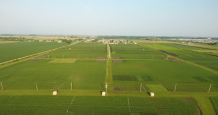
Improved model estimates impact of ozone on soy crops
The impact of ozone on soybean production can be predicted more accurately thanks to improvements to a computer modelling system.

Experts offer roadmap for Biden administration to calculate social cost of carbon in new analysis
The Biden administration should reinstate the estimated economic cost of CO2 emitted to $50 a ton, a group of leading researchers has said.

Climate 'tipping points' need not be the end of the world
The disastrous consequences of climate "tipping points" could be averted if global warming was reversed quickly enough, new research suggests.

Using human rights laws may be most effective way of harnessing international legislation to protect the Amazon, study shows
Using laws governing human rights may be the best way of harnessing international legislation and tribunals to protect the Amazon, a new study shows.

“Stark warning”: Combating ecosystem collapse from the tropics to the Antarctic
Eminent scientists warn that key ecosystems around Australia and Antarctica are collapsing, and propose a three-step framework to combat irreversible global damage

Global warming poses threat to food chains
Rising temperatures could reduce the efficiency of food chains and threaten the survival of larger animals, new research shows.

Tenfold increase in CO2 emissions cuts needed to stem climate emergency
New research shows 64 countries cut their fossil CO2 emissions during 2016-2019, but the rate of reduction needs to increase tenfold to meet the Paris Agreement aims to tackle climate change.

Evolution of ocean 'twilight zone' creatures linked to global climate change
A team led by scientists from Cardiff University has, for the first time, been able to track the development of the largest and least understood habitat on Earth.

Combining public health and environmental science to develop pollen forecasting
New research, which brings healthcare data together with ground-breaking ecological techniques, could set a roadmap for refining pollen forecasts in the future.

Exeter tops sustainability 'teach-in'
The University of Exeter has topped the 2021 list of universities pledging to include the Sustainable Development Goals (SDGs) within teaching, learning and assessment.

Carbon uptake in regrowing Amazon forest threatened by climate and human disturbance
Large areas of forests regrowing in the Amazon to help reduce carbon dioxide in the atmosphere are being limited by climate and human activity.

Online tool measures community carbon footprint
Communities can measure their carbon footprint using a new online tool.

Take care when measuring biodiversity or risk ‘misguiding policy’, experts warn
Greater care needs to be taken when measuring the success of public spending on biodiversity to avoid ‘misguiding policy and spending’, leading researchers have warned.

Rock glaciers will slow Himalayan ice melt
Some Himalayan glaciers are more resilient to global warming than previously predicted, new research suggests.

Exeter ranked 63rd in the world in Times Higher Education Impact Rankings
The University of Exeter’s commitment to sustainability and tackling inequality on the global stage has been recognised in the latest influential rankings.

UK’s top five most influential climate scientists from University of Exeter
The University of Exeter is home to the UK’s top five most influential climate scientists - the only UK climate scientists to secure places in the global top 21 - according to a prestigious new list.

‘Ecosystem measure’ designed to address shortcomings of GDP approved by United Nations
A new way of measuring economic growth that reveals the enormous value of the natural world has been officially approved by the United Nations.

Oceans may become a less efficient carbon sink
The world's oceans could soak up less carbon or even beginning emitting carbon in the future, a new UNESCO report warns.

Brazilian Amazon released more carbon than it stored in 2010s
The Brazilian Amazon rainforest released more carbon than it stored over the last decade – with degradation a bigger cause than deforestation – according to new research.

Warming of 3°C could cause major jump in Antarctic ice melt
Global warming of 3°C could lead to a major jump in melting of the Antarctic Ice Sheet, according to a new study.

Some meat eaters disgusted by meat
Some meat eaters feel disgusted by meat, according to a new study.

New evidence of major impacts of climate change on coral reef growth
The window of opportunity to protect the structure of the world’s coral reefs is still open but time is running out, new research shows.

Antarctic ice sheet retreat could trigger chain reaction
The Antarctic ice sheet was even more unstable in the past than previously thought, and at times possibly came close to collapse, new research suggests.

Few realistic scenarios left to limit global warming to 1.5°C
Of the over 400 climate scenarios assessed in the 1.5°C report by the Intergovernmental Panel on Climate Change (IPCC), only about 50 scenarios avoid significantly overshooting 1.5°C.
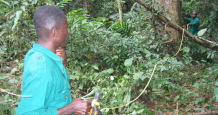
African rainforests still slowed climate change despite record heat and drought
Scientists studying the impact of record heat and drought on intact African tropical rainforests were surprised by how resilient they were to the extreme conditions during the last major El Niño event.

Save our oceans to protect our health – scientists call for global action plan
Scientists have proposed the first steps towards a united global plan to save our oceans, for the sake of human health.

New tools needed to prevent plant disease pandemics
Plant disease surveillance, improved detection systems and predictive modelling – integrated at the global scale – are necessary to mitigate future plant disease outbreaks and protect the global food supply, researchers say.

Rigour and detail key for climate transformation
Organisations must examine every detail of their environmental impact to tackle the climate emergency, a leading researcher says.

'Champagne' technology to capture carbon dioxide via the oceans
A new method of capturing carbon from seawater could help us tackle climate change.
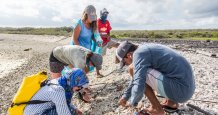
Plastic in Galapagos seawater, beaches and animals
Plastic pollution has been found in seawater, on beaches and inside marine animals at the Galapagos Islands.

Study pinpoints key causes of ocean circulation change
Researchers have identified the key factors that influence a vital pattern of ocean currents.

University of Exeter to play a key role in new £20 million industrial decarbonisation centre
Researchers from the University of Exeter are involved with two projects as part of the new £20 million Industrial Decarbonisation Research and Innovation Centre (IDRIC).
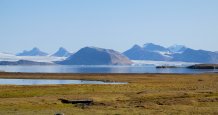
Substantial carbon dioxide emissions from northern peatlands drained for crop cultivation
A new study shows that substantial amounts of carbon dioxide were released during the last millennium because of crop cultivation on peatlands in the Northern Hemisphere.

Culture shift needed to tackle climate crisis
Tackling the climate crisis will require embracing new ways of thinking and challenging dominant social and economic practices, a new book suggests.

Scientists warn G7 humanitarian and economic costs of breaching 1.5C will far exceed costs of achieving it
A group of world-leading climate scientists are calling on global leaders to factor in the economic, environmental and humanitarian costs of failing to keep global warming below 1.5C this century.

University of Exeter plays a leading role in latest UK Climate Change Risk Assessment
Action to improve the nation’s resilience is failing to keep pace with the impacts of a warming planet and increasing climate risks facing the UK.

COVID-19’s socio-economic fallout threatens global coffee industry
COVID-19’s socio-economic effects will likely cause another severe production crisis in the coffee industry, according to new research.

Top climate scientist tells Citizen's Assembly: 'We must act now to reduce carbon emissions'
The devastation inflicted on future generations and the environment if we don’t act to reduce carbon emissions now was laid bare at Devon’s Climate Assembly this week by one of the UK’s top climate scientists.

Plant-based proteins among food-production positive 'tipping points'
Triggering positive "tipping points" could transform the way we produce food and use the world's land, according to a new report.

Earth’s vital signs worsen amid business-as-usual mindset on climate change
Twenty months after declaring a climate emergency and establishing a set of vital signs for the Earth, a coalition of researchers says “unrelenting business as usual” has led to alarming results.

Past abrupt climate changes provide 'early warning signals' of cascading tipping points
Past tipping points triggered cascades of global climate, ecological and societal change, researchers say.

Olympic sports making slow progress on environmental sustainability, study finds
Most International Federations in this summer’s Olympics are taking minimal if any action at all on climate and the environment, a new study has found.

Crop farmers face new disease pressures as climate changes
Climate change will increase the burden of crop diseases in some parts of the world and reduce it in others, new research suggests.

Major Atlantic Ocean current system may be approaching critical threshold, research shows
A major current of the Atlantic Ocean – which acts like a global-scaled conveyor belt and includes the Gulf Stream - may have been losing stability over the last century, research has shown.

Unrealistic experiments mean true impact of nitrogen pollution on the environment is unknown, study warns
Unrealistic scientific experiments mean the true impact of nitrogen pollution on the environment remains poorly understood, a new study warns.

Exeter 'canary craftivists' call for climate action
Staff and students from the University of Exeter have joined a national campaign to sew yellow canaries as a symbol of the climate crisis.

Rethink 'cost-benefit analysis' to tackle climate crisis
Policymakers need better analysis tools to help them tackle the systemic climate crisis, experts say.
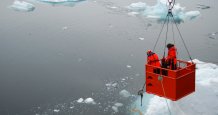
How climate change could impact algae in the global ocean
Global warming is likely to cause abrupt changes to important algal communities because of shifting biodiversity "break point" boundaries in the ocean, according to new research.

Rising research star secures prestigious Fellowship
One of the University of Exeter’s rising research stars has been awarded a prestigious Engineering Research Fellowship, it has been announced.

Artificial intelligence may be set to reveal climate change tipping points
Researchers are developing artificial intelligence that could assess climate change tipping points.

Exeter 13th on global list of climate experts
The University of Exeter is ranked 13th on a global list of experts in "climatic processes".

Devon's Climate Assembly shows the way to a net-zero future
The Devon Climate Assembly has developed and voted in support of a range of measures that if implemented would significantly cut carbon emissions across the county.
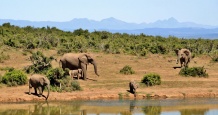
Oppenheimer Generations Research and Conservation partner with University of Exeter in £2.3 million programme to support environmental leadership in Africa
A six-year programme to research land management and ecosystem resilience in Africa was initiated in October 2021 thanks to philanthropic support from the Oppenheimer Generations Research and Conservation.

Climate denial and scientific discoveries 'emerged simultaneously'
Denial of climate science emerged simultaneously with key scientific discoveries about humanity's impact on our planet, according to a new book.

App boosts Amazon tree project
A new app will help small-scale farmers grow trees and earn a living in deforested parts of the Amazon.

Reviews highlight consequences of failing to tackle climate change
A set of scientific reviews published today reinforces the urgent need for global action to reduce the impact of climate change on vital carbon sinks, our oceans and the Arctic.

Scientists and industry to discuss energy transformation at COP26
Leading researchers and representatives of the energy sector will meet at COP26 to discuss transforming the energy system to help deal with climate change.

Exeter scientists cycling to Glasgow for COP26
Two University of Exeter scientists are cycling to Glasgow for the COP26 UN climate change conference.

Peatlands can help fix our climate
Preserving and restoring peatlands can help us tackle the climate crisis, researchers say.

Global carbon emissions rebound close to pre-Covid levels
Global carbon emissions in 2021 are set to rebound close to pre-Covid levels, according to the Global Carbon Project.

Green transition creates new risks and rewards
Different countries face different risks and opportunities as the world switches from fossil fuels to renewable energy, researchers say.

Governments need to address inevitable risks of losses and damages from climate change, says OECD
As governments face the challenge of delivering on their net-zero by 2050 commitments, a new OECD report says they must focus in parallel on reducing and managing the inevitable risk of further losses and damages from climate change.

Experts to discuss climate risk and adaptation
Climate risks and adaptation will be discussed by a panel of experts at COP26 in Glasgow.

Convex launches Seascape Survey Partnership with Blue Marine Foundation
Convex Group Limited (Convex) today announces a multi-million-dollar partnership with the Blue Marine Foundation (BLUE), a charity dedicated to restoring the ocean to health, and the University of Exeter and its foremost researchers, with the launch ofthe Convex Blue Carbon Seascape Survey.
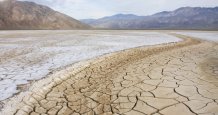
One billion face heat-stress risk from 2°C rise
The numbers of people in regions across the world affected by extreme heat stress – a potentially fatal combination of heat and humidity – could increase nearly 15-fold if the world’s temperature rise reaches 2°C.
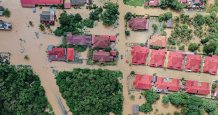
High-impact climate events: Better adaptation through earlier prediction
The prediction of high-impact climate phenomena can be substantially improved by a new mathematical approach that analyses the connectivity and patterns between geographical locations, scientists say in a new publication.

Exeter researchers give COP26 verdict
University of Exeter researchers have given their views on the COP26 climate change conference.

Exeter academics on list of top researchers
Twenty-two University of Exeter academics have been named on an annual list of highly cited researchers.
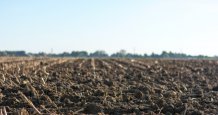
Warmer soil stores less carbon
Global warming will cause the world's soil to release carbon, new research shows.

Exeter launches Green Futures Scholarships
Talented students from low-to-middle-income countries will study at the University of Exeter thanks to new Green Futures Scholarships.
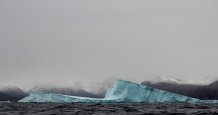
Rainfall in the Arctic may soon be more common than snowfall
More rain than snow will fall in the Arctic – and this transition will occur decades earlier than previously predicted, a new study reports.
